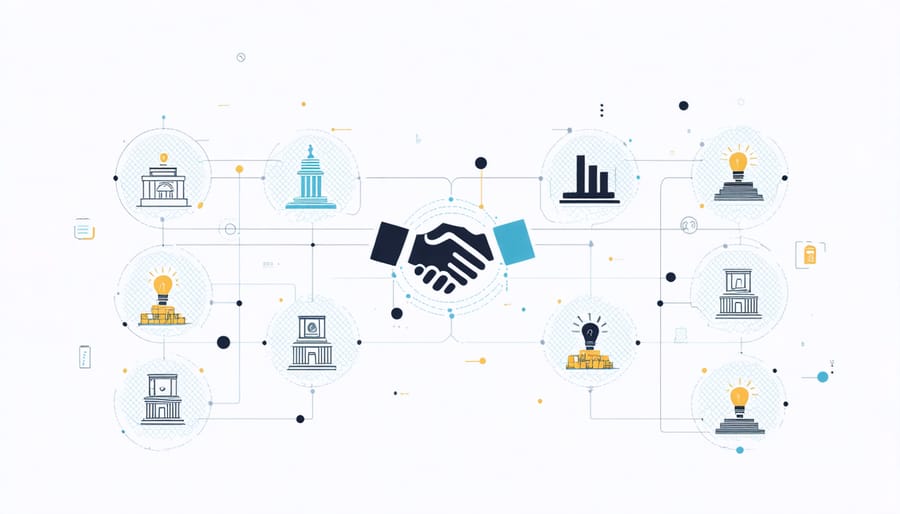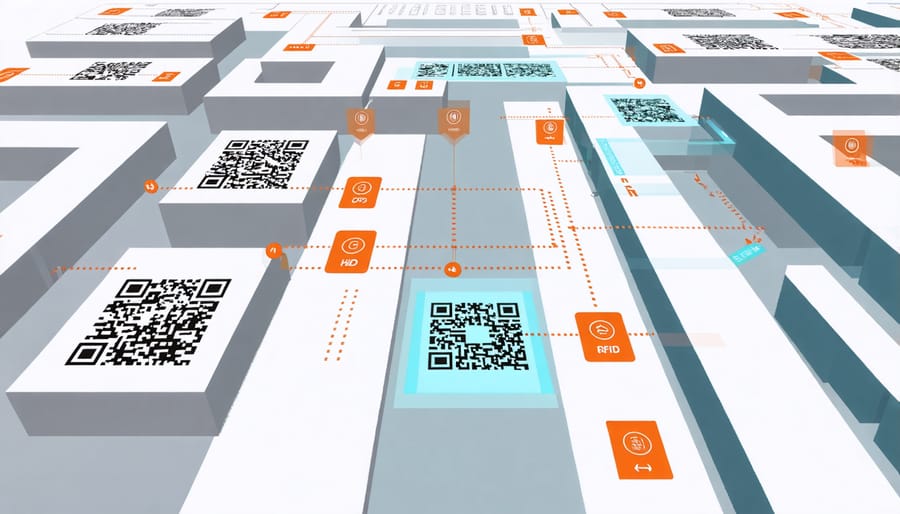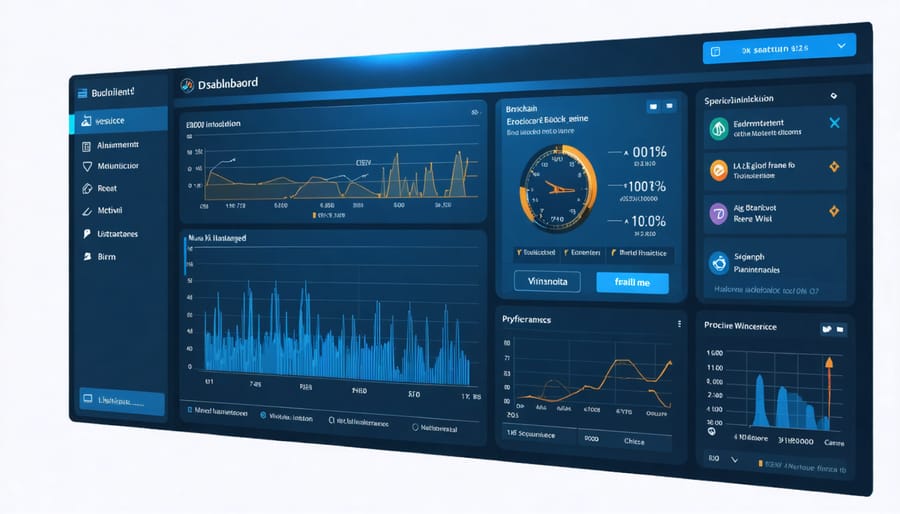Blockchain technology stands poised to revolutionize the construction industry’s supply chain management, project delivery, and operational transparency. By 2025, experts project that blockchain solutions will manage over $175 billion in construction-related transactions, fundamentally transforming how projects are executed, verified, and documented. For construction professionals navigating this digital transformation, blockchain offers unprecedented opportunities to streamline procurement processes, automate payment systems, and establish immutable records of material authenticity and compliance.
Smart contracts and distributed ledger technology are already enabling real-time tracking of construction materials from manufacture to installation, reducing delays and ensuring quality control across complex project networks. Leading construction firms implementing blockchain solutions report a 30% reduction in documentation processing time and a 25% decrease in payment-related disputes. This technology’s ability to create transparent, tamper-proof records while automating critical processes positions it as a cornerstone of future construction operations.
As sustainability requirements and regulatory compliance become increasingly stringent, blockchain’s capacity to verify and track environmental credentials, material sources, and certification standards will become indispensable for construction professionals seeking to maintain competitive advantage in an evolving industry landscape.

Smart Contracts Transform Project Management
Automated Payment Systems
Blockchain-enabled automated payment systems are revolutionizing financial transactions in construction projects by creating seamless, transparent, and efficient payment processes. These systems leverage smart contracts to automatically release payments when predetermined project milestones or conditions are met, eliminating payment delays and reducing administrative overhead.
For example, when a subcontractor completes an approved scope of work, the system can automatically verify completion through IoT sensors or digital documentation, trigger payment approval workflows, and execute the transaction instantly. This automation significantly reduces the traditional 30-90 day payment cycles that often strain contractor relationships and project cash flow.
Industry leaders implementing these systems report up to 75% reduction in payment processing time and a 50% decrease in payment-related disputes. The technology also enables progressive payments based on real-time work completion, improving cash flow management for all project stakeholders.
Furthermore, automated payment systems create an immutable audit trail of all transactions, ensuring compliance with contract terms and facilitating easier financial reporting. The integration with project management platforms allows for real-time financial visibility and better budget control.
Looking ahead, these systems are expected to incorporate more sophisticated features like automated tax compliance, multi-currency transactions, and integration with traditional banking systems, making them an essential tool for modern construction project management.
Digital Contract Validation
Digital contract validation through blockchain technology represents a significant advancement in construction project management, offering an immutable and transparent system for executing and monitoring contractual agreements. Smart contracts, which are self-executing programs stored on the blockchain, automatically enforce predefined terms and conditions without the need for intermediaries.
In construction applications, these digital contracts can automatically trigger payments when project milestones are verified, release retainage upon successful completion of work, and ensure subcontractors receive compensation promptly. For example, when a building’s foundation passes inspection, the smart contract can automatically release the associated payment to the concrete contractor, creating an efficient and dispute-free process.
The technology’s ability to maintain an unchangeable record of all contract terms, modifications, and executions significantly reduces the potential for disputes. Each party involved in the project can verify the contract’s status and history at any time, ensuring complete transparency. This feature is particularly valuable in complex projects involving multiple stakeholders and numerous contractual relationships.
According to industry experts, smart contracts can reduce contract administration costs by up to 30% while decreasing dispute resolution time by up to 75%. The system’s ability to automatically flag non-compliance issues and trigger predetermined resolution protocols helps maintain project momentum and reduces costly delays.
Looking ahead, the integration of IoT sensors and real-time data feeds with smart contracts will further enhance their capabilities, enabling even more sophisticated automated contract validation and compliance monitoring.
Real-Time Material Tracking and Authentication
End-to-End Visibility
Blockchain technology is revolutionizing supply chain visibility in construction by creating an immutable digital record of every material, component, and transaction from source to final installation. This unprecedented level of transparency enables project stakeholders to track materials in real-time, verify authenticity, and maintain complete chain of custody documentation.
By implementing digital procurement solutions powered by blockchain, construction firms can now monitor their entire supply network with precision. Each building material receives a unique digital identifier, allowing project managers to instantly access critical information including manufacturing dates, testing certifications, transportation conditions, and installation requirements.
The technology’s distributed ledger system ensures that all supply chain participants – from manufacturers and suppliers to contractors and site managers – have access to the same verified information. This shared visibility significantly reduces disputes, eliminates documentation gaps, and streamlines compliance verification.
Recent implementations have demonstrated remarkable improvements in material tracking efficiency. For example, a major commercial development in Singapore achieved a 40% reduction in material delivery delays by utilizing blockchain-based supply chain tracking. The system enabled real-time coordination between suppliers and site teams while maintaining comprehensive documentation for regulatory compliance.
Looking ahead, this enhanced visibility will become increasingly crucial for managing complex global supply chains and meeting stringent sustainability requirements. The ability to verify material sources, track environmental impact, and maintain complete documentation will be essential for future construction projects.

Quality Assurance Through Immutable Records
Quality assurance in construction has historically relied on manual documentation and trust-based systems, but blockchain technology is revolutionizing how we verify and maintain material quality standards throughout the supply chain. By creating immutable digital records for construction materials, blockchain enables unprecedented transparency and traceability from manufacturing to installation.
Consider a structural steel beam: blockchain technology can record and verify every aspect of its journey, from the initial ore composition and manufacturing processes to transportation conditions and on-site handling. Each stakeholder adds their verification to the blockchain, creating an unalterable chain of custody that ensures material integrity.
Industry leaders are already implementing blockchain-based quality assurance systems. For example, LafargeHolcim has piloted a blockchain platform that tracks cement quality parameters throughout production and delivery, enabling real-time verification of material specifications. This system has reduced quality-related disputes by 85% and accelerated project timelines by eliminating lengthy verification processes.
The technology also enables automated compliance monitoring with building codes and standards. Smart contracts can be programmed to flag any deviations from specified quality parameters, triggering immediate alerts to project stakeholders. This proactive approach to quality control helps prevent the use of substandard materials and reduces the risk of costly remediation work.
Furthermore, blockchain’s immutable records provide invaluable documentation for warranty claims, maintenance planning, and future renovations, ensuring that building owners and facility managers have accurate, tamper-proof records of all materials used in construction.
Equipment and Asset Management Innovation
Digital Twin Integration
Digital twin technology, when integrated with blockchain, creates a powerful system for real-time asset management and monitoring in construction projects. This convergence enables construction firms to maintain an immutable digital representation of physical assets, from individual components to entire buildings. By combining smart IoT devices with blockchain-verified data, organizations can track asset performance, maintenance history, and lifecycle changes with unprecedented accuracy.
The blockchain-enabled digital twin system provides a single source of truth for asset information, eliminating data discrepancies and enabling better decision-making. For example, when a building component requires maintenance, the digital twin automatically updates its status on the blockchain, creating a tamper-proof record of the intervention. This integration particularly benefits facility managers and property owners by providing real-time insights into asset performance and maintenance requirements.
Recent implementations have demonstrated up to 30% reduction in maintenance costs and 25% improvement in asset longevity through predictive maintenance enabled by this technology. The system also facilitates better collaboration between stakeholders by providing transparent, real-time access to asset information, ensuring all parties work with the same verified data set throughout the asset’s lifecycle.
Predictive Maintenance Systems
Blockchain technology is revolutionizing predictive maintenance in construction by creating immutable digital records of equipment performance and maintenance history. By integrating with equipment tracking systems and IoT sensors, blockchain enables real-time monitoring of machinery health, operational parameters, and maintenance schedules.
This technology creates a transparent, tamper-proof system for documenting equipment lifecycles, from initial deployment to routine maintenance and repairs. Smart contracts automatically trigger maintenance alerts based on predetermined conditions, such as operating hours, performance metrics, or sensor readings, ensuring timely interventions and reducing unexpected breakdowns.
The system’s distributed ledger maintains comprehensive equipment histories, including maintenance records, parts replacements, and performance data. This wealth of information enables advanced analytics to predict potential failures before they occur, optimizing maintenance schedules and extending equipment lifespan.
Construction companies implementing blockchain-based predictive maintenance report significant improvements in equipment uptime, reduced maintenance costs, and better resource allocation. The technology also enhances accountability by creating verifiable records of maintenance activities, ensuring compliance with warranty requirements and regulatory standards while minimizing disputes between equipment owners, operators, and service providers.

Sustainability and Compliance Tracking
Carbon Footprint Monitoring
Blockchain technology is revolutionizing carbon footprint monitoring in construction by providing an immutable and transparent system for tracking emissions across the entire building lifecycle. This innovative approach enables construction companies to maintain detailed records of their carbon emissions, from material production through construction and building operation.
The system works by creating digital tokens that represent carbon credits or emissions data, which are then recorded on a distributed ledger. Each construction activity, material delivery, or energy consumption event generates a transaction that is automatically logged and verified by the network. This creates an auditable trail of environmental impact data that cannot be altered or manipulated.
Leading construction firms are already implementing blockchain-based carbon tracking systems. For example, a major European construction company recently deployed a pilot program that reduced carbon reporting errors by 45% while cutting administrative costs by 30%. The system automatically collects data from IoT sensors, equipment monitors, and supply chain partners to create a comprehensive emissions profile.
These platforms also facilitate carbon credit trading and sustainability certification processes. Construction companies can more easily demonstrate compliance with environmental regulations and earn green building certifications by providing verifiable emissions data. The transparency offered by blockchain technology helps prevent greenwashing and ensures accountability in environmental reporting.
As environmental regulations become stricter, blockchain-based carbon monitoring systems will become essential tools for construction companies seeking to maintain competitive advantage while meeting sustainability goals.
Regulatory Compliance Automation
Blockchain technology is revolutionizing regulatory compliance in the construction industry by creating immutable, transparent records of all project-related activities and documentation. This automation streamlines the traditionally complex and time-consuming compliance processes while significantly reducing the risk of non-compliance and associated penalties.
The technology enables real-time monitoring of construction activities against regulatory requirements, automatically flagging potential violations before they become serious issues. For instance, when building codes or safety regulations are updated, smart contracts can automatically adjust verification parameters, ensuring all new work meets current standards.
Document verification and submission processes become seamless through blockchain-based systems. Building permits, inspection reports, and compliance certificates are automatically validated and stored on the blockchain, creating an audit trail that regulatory bodies can access instantly. This transparency significantly reduces the administrative burden while improving accountability across all stakeholders.
Several construction firms have reported up to 60% reduction in compliance-related administrative costs after implementing blockchain-based regulatory systems. The technology also enables automatic reporting to multiple regulatory bodies simultaneously, eliminating duplicate submissions and reducing the potential for human error.
Looking ahead, blockchain’s role in regulatory compliance will expand to include automated insurance verification, worker certification tracking, and real-time environmental impact monitoring. This evolution will create a more efficient, transparent, and reliable compliance framework for the construction industry, ultimately leading to safer and more sustainable building practices.
As we look to the future, blockchain technology stands poised to revolutionize construction supply chains in ways that extend far beyond current applications. The convergence of blockchain with other emerging technologies like IoT sensors, artificial intelligence, and digital twins will create unprecedented opportunities for transparency, efficiency, and innovation in construction operations.
The implementation of blockchain-based solutions is expected to reduce project delays by up to 25% through automated compliance and streamlined documentation processes. Industry experts predict that by 2025, over 30% of major construction firms will incorporate blockchain into their supply chain management systems, leading to an estimated $89 billion in annual cost savings globally.
Perhaps most significantly, blockchain’s ability to ensure material authenticity and track environmental impact will become increasingly crucial as sustainability regulations tighten worldwide. Construction firms that embrace this technology early will gain a competitive advantage in meeting these evolving requirements while building trust with stakeholders.
The challenges of implementation, including initial costs and industry-wide adoption, remain significant hurdles. However, the development of more user-friendly platforms and increasing standardization across the industry are gradually removing these barriers. As successful use cases multiply and ROI becomes more evident, blockchain adoption will likely accelerate exponentially.
The future of construction supply chains lies in creating an interconnected ecosystem where transparency, efficiency, and sustainability converge. Blockchain technology will serve as the foundational infrastructure enabling this transformation, fundamentally changing how we plan, execute, and verify construction projects.

